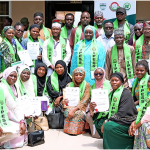





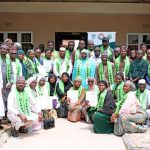
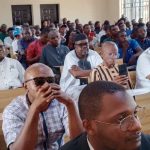
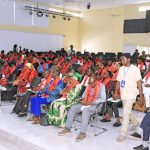

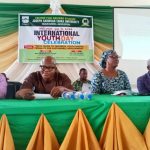
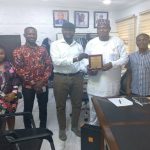
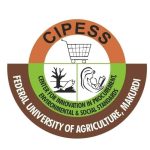
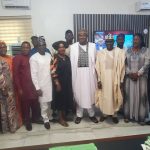
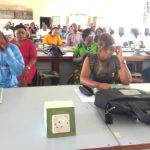
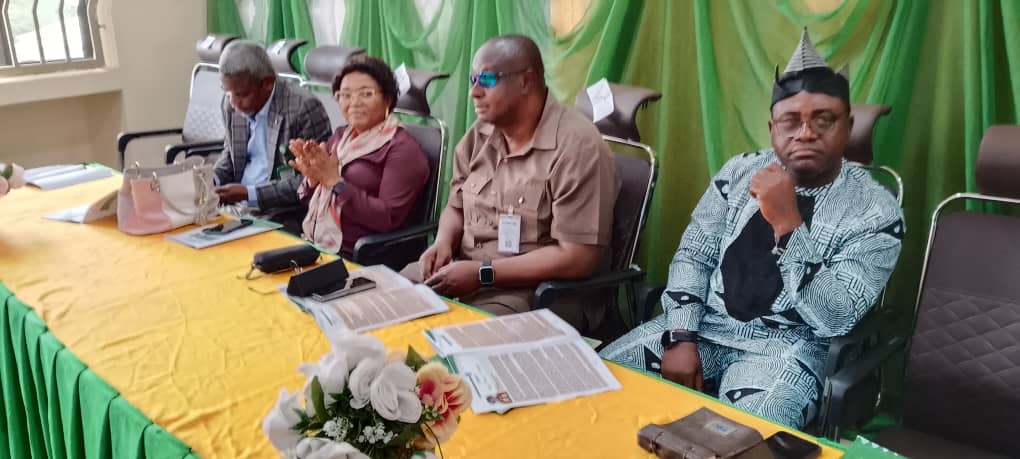
Staff of the College of Engineering, Joseph Sarwuan Tarka University, Makurdi (JOSTUM), on Thursday, 28th August 2025, hosted the Vice-Chancellor, Engr. Prof. Isaac Nathaniel Itodo, to a grand reception at the new Departmental Building of the Department of Agricultural and Biosystems Engineering. The event was organised to honour him on his elevation as the 7th Vice-Chancellor of JOSTUM.
Delivering the welcome address, the Chairman of the occasion and Dean of the College of Engineering, Engr. Prof. Martins Udochukwu, described the Vice-Chancellor as an illustrious son of the College and an accomplished academic whose achievements are evident within the University and the larger society. He said Prof. Itodo’s rise to the exalted office of Vice-Chancellor was a testament to his diligence, hard work, and selflessness in pursuing academic excellence, social productivity, and community service.
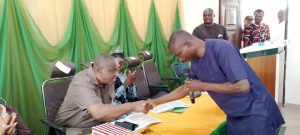 Prof. Udochukwu noted that the reception was necessary because “those who celebrate excellence and appreciate their own, in time, will be rewarded with more.” He further expressed the College’s gratitude for all Prof. Itodo had done for the Engineering family before becoming Vice-Chancellor, as well as the enviable feats he has so far accomplished for the College since assuming office.
Prof. Udochukwu noted that the reception was necessary because “those who celebrate excellence and appreciate their own, in time, will be rewarded with more.” He further expressed the College’s gratitude for all Prof. Itodo had done for the Engineering family before becoming Vice-Chancellor, as well as the enviable feats he has so far accomplished for the College since assuming office.
Highlighting some of Prof. Itodo’s achievements for the College and the University at large, the Dean listed:
1. Construction of the magnificent Agricultural and Biosystems Engineering building in record time.
2. Landscaping of the IPESS and Electrical and Electronics Engineering buildings.
3. Construction of the Journal of Agriculture, Science and Engineering Technology building, as well as the Engineering Drawing Studio and Library — both at advanced stages of completion.
4. Unbundling of Departments in the College with NUC approvals, including:
Splitting the Department of Electrical and Electronics Engineering into Electrical and Electronics Engineering, Computer Engineering, and Telecommunications Engineering.
Splitting the Department of Agricultural and Environmental Engineering into Agricultural and Biosystems Engineering, and Environmental Engineering.
5. Seamless promotion of academic staff to the Professorial Cadre.
6. Overhaul of examination result processing, which has resulted in the timely graduation and NYSC mobilisation of students — a milestone long sought before Prof. Itodo’s tenure.
The Dean, however, observed that the College still had pressing needs due to years of accumulated challenges. He appealed to the Vice-Chancellor to extend his philanthropic disposition to address critical areas such as the renovation of old buildings, replacement of leaking roofs and weak ceilings, upgrading of laboratory equipment, improved lighting, internet connectivity, water reticulation and drainage systems. He also requested recruitment of additional academic staff, greater access to quality research publications, and the construction of new offices, laboratories, and lecture halls to match the College’s expansion.
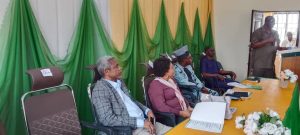 In his response, the Vice-Chancellor praised his home College, particularly the Dean, for the thoughtfulness of hosting him to such a grand reception. He said recognition of this nature strengthens leaders entrusted with responsibility, motivating them to work even harder. He commended the staff, especially Professors in the College, for their cooperation, dedication, and selfless service.
In his response, the Vice-Chancellor praised his home College, particularly the Dean, for the thoughtfulness of hosting him to such a grand reception. He said recognition of this nature strengthens leaders entrusted with responsibility, motivating them to work even harder. He commended the staff, especially Professors in the College, for their cooperation, dedication, and selfless service.
Prof. Itodo stressed that nation-building is a collective responsibility and assured that his administration would not rest until it bequeaths a stronger JOSTUM at the end of his tenure. He commended Prof. Udochukwu for leading the College with enthusiasm, God-fearing values, and without rancour.
On his stewardship, the Vice-Chancellor reaffirmed his administration’s resolve to utilise available resources to reposition JOSTUM as a national pride and a globally competitive institution. He urged staff to support this vision and challenged the alumni to take pride in their alma mater, reminding them that no one else could do so on their behalf.
In their separate remarks, staff of the College and other members of the University community praised Prof. Itodo’s positive disposition and dogged determination, which they said had driven results. They commended his reforms — including the unbundling of academic programmes and the timely processing of results — which have transformed attitudes to work and study, and contributed to the surge in student enrolment.
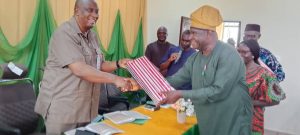
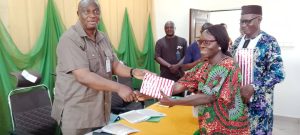
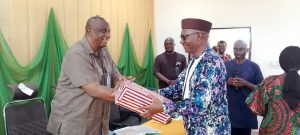





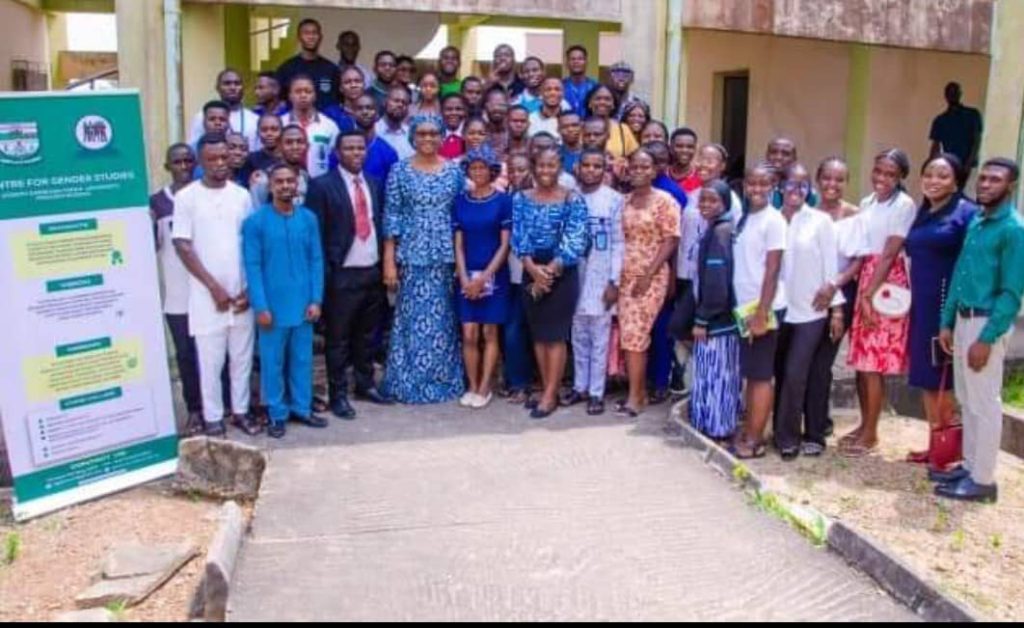
Commemorating the 2024 International Youth Day, the Center for Gender Studies, Joseph Sarwuan Tarka University, Makurdi organized a one-day symposium with the theme: “FROM CLICKS TO PROGRESS: YOUTH DIGITAL PATHWAYS FOR SUSTAINABLE DEVELOPMENT.”
The event was held on Monday, 12th August, 2024 at the College of Agricultural Economics and Extension Auditorium, North Core.
In his opening remarks, the Vice Chancellor, Engr. Prof. N.I Itodo represented by the Deputy Vice Chancellor Academic, Prof. Fidelis Ayatse charged the participants to make good use of the event as it x-rays the opportunities and challenges youths face in accessing digital technology. He urged them to utilize the knowledge to foster positive change.
In her welcome address, the Organizer and Director, Center for Gender Studies, Prof. Mrs. Orefi Abu said the International Youth Day is a day chosen by the United Nations celebrated globally every year to recognize young people’s vital contributions – and the need to release the potentials that they hold towards development and global economy. She added that the Day also recognizes their challenges and how to reduce them.
Prof. Abu noted that this year’s theme highlights the role of digital technology in achieving sustainable development goals – and draws attention to the important roles that youths play in these innovative processes.
She said that as young people, they have the ability to use their digital skills to promote sustainable development, and positive changes both within and outside our communities. She declared that the Center is ready to collaborate with the Student Union and other associations in the University to mark this day, going forward.
In the lead presentation titled “SIGNIFICANCE OF DIGITAL LITERACY FOR YOUTH EMPOWERMENT: CHALLENGES AND OPPORTUNITIES,” Dr. Chris Eche defined digital literacy as the ability to effectively and critically navigate, evaluate and create information using a range of digital technologies. He said there are two sets of people in the digital space; those who are able to critically navigate and those who are able to create information. He outlined the different levels of digital skills to include; Basic digital skills, Internet and communication skills, Information literacy, Literacy skill set, Content creation level, Cyber security and Problem solving.
Dr. Eche acknowledged that digital literacy is crucial for empowering the youth in various aspects of life from education and employment, to civic participation and personal development. He stated that while there are challenges to achieving digital literacy there are also significant opportunities to address these challenges through targeted policies, educational reforms, community initiatives, and innovative learning.
Presenting the second paper titled “YOUTH AND DIGITAL ADVOCACY: THE POWER OF SOCIAL MEDIA FOR SOCIAL CHANGE AND SUSTAINABLE DEVELOPMENT,” Dr. Mrs. Hephzibah O. Obekpa observed that in an increasingly advancing world, digital literacy has been identified as a powerful tool for driving social change. She said Social media platforms are not just for communication but powerful travel engines for organization and activism.
She pointed out that the power of the youth in digital advocacy can be explored through their unique perspectives and passion, creativity and innovation, energy and resilience, education and knowledge, social media movement, policy influence and intergenerational collaboration.
Furthermore, She explained that Social media for change and social development should be one that uses the resources responsibly with the next generation in mind – emphasizing that any change that has to be sustainable must look beyond the current generation.
Dr. Obekpa concluded that young people are not the leaders of tomorrow but change makers of today. She said digital liaising offers unprecedented opportunities for youths to amplify their voices, influence policies, and drive social change on a global scale; therefore, it is crucial that young advocates are equipped with skills, knowledge, and critical framework to navigate effectively and responsibly.
Speaking on the topic “YOUTH AND MENTAL HEALTH IN THE DIGITAL AGE” Dr. Nathaniel Iber said everybody loves good health whereas mental illness is an enemy of progress and it cuts across all ages. He noted that whenever a persons abnormal thoughts, feelings or sensory impressions cause him objective or security harm mental health is said to be present.
Dr. Iber explained that mental health could be caused by alcohol, excess stress and inability to organize time well. He opined that social media has become an integral part of youths’ lives, affecting their self esteem, body image, and overall mental well-being.
The Doctor said the impact of social media could result in anxiety and depression through cyber bullying, online harassment and digital addiction however it also provides platforms where one can seek help, like, seeking online therapy and also digital literacy and education.
In a closing remark Prof. Solomon Shola suggested that the University should enter into partnership with a Company to provide incoming students with tablets so as enhance easy access to information through their years of study.
He thanked the organizers of the event and hopes that the programme be sustained.
The event witnessed sessions of questions and answers, as well as drama presentation.
